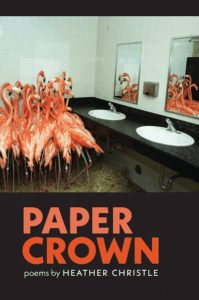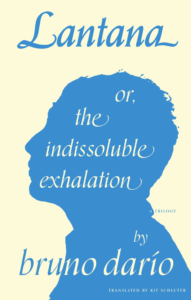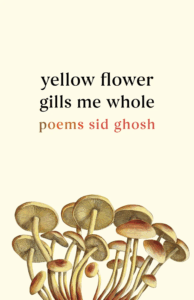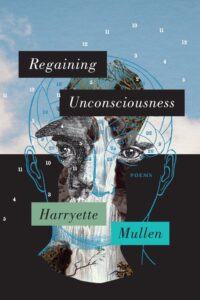Unimprovable Penis-Forward Poems and More! Seven Poetry Books to Read This August

A few years back, after I read with her in a group poetry reading, an acquaintance gave me a compliment I haven’t forgotten: “People laugh at your poems.” Well, I hoped it was a compliment. Maybe my poems were laughably bad, and my fellow poet was the first person to break it to me.
Reading through a stack of the summer’s new books, I’ve found plenty of poetry as funny as written-down stand-up comedy: poems to be laughed at, in only the most affirmative senses. Some books lead with humor in their titles: Taylor Byas’s Resting Bitch Face, Harryette Mullen’s Regaining Unconsciousness. Others get started in their opening poems, like Heather Christle’s Paper Crown, which in mere lines moves from relatable self-deprecation—“Somehow / I own like six nail clippers / and I honestly can’t / remember ever buying / even one”—to a riff on deer and their hypothetical diaries: “the first entry would / read: Was born / Was licked / Tried walking / Then they’d walk / away and no second / entry would ever exist.” Sasha Debevec-McKenney’s début Joy Is My Middle Name begins with a “Cento for the Night I Tried Stand-Up,” a versified collage of lines by several dozen comedians. The poem’s funny, several times over—thanks to the lines themselves and the full routines they recall, to the chains of non sequiturs and shuffled-together contexts bridging them, and even to Debevec-McKenney’s note on the poem over a hundred pages later: “I believe poetry and stand-up are the same, except stand-up routines take the audience’s enjoyment into consideration. Also, stand-ups don’t try and hide the fact that, at their core, they only want to be liked.”
Other new books flaunt the virtues of the best jokes: disproportion, meticulous verbal pacing, a knowhow about readerly expectations and the guts to outrun them. You can find all the above in Sid Ghosh’s break-up poem “No Thanks,” an open-faced sandwich of a comforting truth atop a polite farewell:
Penises
abound
see you
around
There are plenty more fish in the sea, Ghosh knows, but that proverb is at once too wordy (eight whole words?) and needlessly metaphorical (who cares about fish?): hence his unimprovable penis-forward poem.
Serious aspirations and sober subjects don’t preclude humor: if anything, they provide even more things to poke fun at. Humor often stays submerged in Alicia Wright’s You’re Called by the Same Sound, but after several dozen poems set in the history-haunted South, she lands a punchline of a title: “I Won’t Write You a Country Poem.” (Its first line is readymade for country radio: “I’m feeling low and unforgiving.”) bruno darío’s trilogy Lantana; or, the indissoluble exhalation, translated from the Spanish by Kit Schluter, ends with dramatic monologues by the deceased and increasingly decomposed title character. But not even death could keep her from making macabre puns—“Gruesome to serve face, to let it fall off”—or griping about the afterlife’s amenities: “Had I known / that language persists during the ‘definitive’ stasis, / I’d have brought my phone.” Turns out you can take it with you, so—like the books below—try to say something poetic.
*

Taylor Byas, Resting Bitch Face
(Soft Skull)
Resting bitch face—a face whose default expression is perceived by others as pissy, prissy, or any other color of the bitchy rainbow—was first named in the 2010s, though of course the phenomenon is much older; one scholar claims to see it in Hyacinthe Rigaud’s stone-cold portrait of King Louis XIV of France. Taylor Byas calls back to that cackling and (despite Louis XIV) sexist meme in her second collection’s title poem, a confrontation with a “you” who can’t help but read its insecurities and prejudices into Byas’s appearance: “Something about the set of my face says slave, cracks sharp in its stank and slits you uncomfortable.” Even a gesture as innocuous as a smile, Byas knows, glints with violent histories: “Last time I smiled for a man my teeth sparked white in the dark of his bedroom like police lights in a rearview mirror.”
What we see in something as superficial (and alluring) as a face is a throughline Byas tugs and torques through her new collection, in sections named after painting terms (“Canvas,” “Gesso,” “Dry Down”), in responses to canonical artworks (“Well Damn, Picasso”) and meditations sparked by museum- and moviegoing. Byas’s pantoums, duplexes, and sonnet sequences flaunt a rigorous formalism, but she may be even better at decomposing than at composing: blacking out and recontextualizing her own polished words, refuting her poems with contrasting poems packed into footnotes, Byas scrutinizes the multiple facets of every face.

Heather Christle, Paper Crown
(Wesleyan University Press)
In a new poem titled “Shelter in Place,” Heather Christle gives a life-or-death warning unique to her profession: “When you write a book you must not / forget to build a door you can use / to get out or else you will die there.” She’s speaking from recent, rattled experience. Paper Crown, her fifth collection, is her first since two admired works of prose nonfiction, one a compendium of tears (2019’s The Crying Book), the other a braiding of traumatized narrative and historical reenactment (this year’s In the Rhododendrons: A Memoir with Appearances by Virginia Woolf).
In Christle’s latest poems, memory features appearances from the literary, the everyday from the otherworldly: “How do you say ‘inopportune’ / in a small forest of cell phone towers / disguised as bizarrely regular trees?” (Maybe that sort of “small forest” sounds dystopian; in fact, it’s a mainstay of suburban Atlanta, where Christle lives and teaches.) Christle’s chief subjects are less reality or the imagination than the human faculties that knead one into the other—grief, whimsy, worry, dreaming, and of course poetry, which (like the titular paper crown) folds a flat, everywhere-found medium into a kingdom you can live in: “A monarchy is an imaginary house // with real toads in it, they say.”

bruno darío, Lantana; or, the indissoluble exhalation, translated from the Spanish by Kit Schluter
(Ugly Duckling Presse)
His name was printed all lowercase; the books carrying his name were nothing short of epic. In his twenty-nine years, the Mexican poet bruno darío (1993-2022) published three books in Spanish: celebración, espanto (feast, fright), mal de aire (airsickness), and asolar (raze), together forming the trilogy Lantana, o la exhalación indisoluble (Lantana; or, the indissoluble exhalation). This summer, Ugly Duckling Presse collected the trilogy in a bilingual edition that, as darío’s English translator and close friend Kit Schluter notes in his touching introduction, “is the first in any language to unite all three volumes.” feast, fright introduces the trilogy’s main characters—Lantana or Anfitriona (Hostess) and her all-suffering young love, the Inconsolable—in their own voices, in a closet drama of cryptic soliloquies: “Tihs gerenation wlil not inrehit a tteber tufure,” one begins. airsickness, darío’s longest book, finds the Inconsolable yearning for connection after Lantana’s suicide, writing letters to anyone who’ll take them, the late Lantana included: “I’m boring. You don’t answer. I wish I knew how to do acrobatics or something you find entertaining.”
Not even the inventive gall of his first two books can prepare you for raze, whose poems feature Lantana’s remains speaking “from her earthen enclosure, cheerful and impatient by turns”—except when “Gravity is heard,” and the impersonal laws of materiality have their say. Published and partly translated during darío’s final months, raze is at once a last testament and, as it zooms out, an effort to speak above and beyond last testaments: “You write out of a flunked sadness. You seek the shipwreck by its name and other such nonsense. And even so, your song flows the riverbed.”

Sasha Debevec-McKenney, Joy Is My Middle Name
(W.W. Norton and Fitzcarraldo Editions)
The Victorian philosopher John Stuart Mill claimed poetry was not “heard” but “overheard”: if that’s true, then there’s no new poet I know who’s more poetic than Sasha Debevec-McKenney, our latest overhearer laureate. She’s not the first person to find poetry in Anne Carson’s conversational gems, things your parents meant (or didn’t mean) for you to hear, or the weird ways people talk to their pets: “once, at the butcher shop, / a man said to his dog, ‘That’s / the nice lady who smells like meat.’” But she must be the first to overhear the poetry in Real Housewives of New York City taglines, the masturbation-addiction subreddit r/NoFap, and the Nicolas Cage film National Treasure.
All the while she’s overhearing herself—listening back to her last joke or out-of-nowhere simile and proceeding to outriff herself, or reconsidering her past selves the morning after or a decade later, as in a “found poem from my tweets, 2009-2021” (which includes the word “literally” in every sentence). In the distances between things and the stories we tell about them—between her multidimensional self and her stand-up-inspired personae, between historical accuracy and overblown American myths—Debevec-McKenney finds her peculiar combination of ironic remove and fond humor: who else could write titles like “I Bring the Wart Removal Kit with Me to the July 4th Party” and “When I Met Sharon Olds She Told Me to Write a Poem about LBJ’s Penis.”

Sid Ghosh, Yellow Flower Gills Me Whole
(Milkweed Editions)
There’s little in contemporary poetry quite like Sid Ghosh’s minimalist gizmos. Silly, surreal, and sacred all at once—starting with titles like “Marigolds Marry Gold” and “Hats Have Feelings,” swerving in one pencil-thin stanza to invocations to God and unembarrassed avowals like “I am thy clay”—Ghosh’s poems recall mystics and mavericks generations his senior: the fifteenth-century Bhakti poet Kabir, the American poets Robert Creeley and A.R. Ammons at their oddest and itty-bittyiest. Standing apart from both everyday speech and high-flown poetic diction, they communicate instead in blink-and-you’ll-miss-them puns and homophones, linguistic glitches and syntactic red herrings.
Take the book’s title phrase: “Yellow / flower / gills me / whole.” It’s a paradoxical statement, a portrait of a “whole” human who’s somehow part floral yellow and part fishy gills—gills that look like (w)holes, but allow this flowy flower to breathe in airless environments. Ghosh’s one-to-two-word lines, thick with luscious ls and ws, are at once ornate arrangements and liquid mouthfuls. Ghosh titles this poem “Be Mum,” which can mean either “be a chrysanthemum” or “keep quiet,” an injunction that Ghosh—a nonspeaking autistic writer with Down syndrome—subverts on page after page. Some of his poems evade straightforward summary, like one that reads, in full, “May. Be. He. My. Feel. Like. Me.” Others, from the first to the fiftieth reading, remind me of Samuel Taylor Coleridge’s definition of poetry as “the best words in their best order.” I wouldn’t want a single word changed in Ghosh’s giddy tongue-twisters—“Haystacks, I need / the needle of queer // bees and queen / peace”—or clear-eyed certainties: “Generations of men / have killed // so I can kiss.”

Harryette Mullen, Regaining Unconsciousness
(Graywolf Press)
For several decades running, Harryette Mullen released collections with the cohesiveness and cultic ardor of concept albums. First came the trio of Trimmings (1991), S*PeRM**K*T (1992), and Muse & Drudge (1995) (centered on clothing, food, and figures of Black womanhood, respectively); then the abecedarian hilarity of Sleeping with the Dictionary (2002); and most recently Urban Tumbleweed: Notes from a Tanka Diary (2013). Regaining Unconsciousness, her first collection in a dozen years, feels like an archival boxset, with over a hundred poems grouped into eleven sections with the impressionistic, welcoming vibe of playlists. The section titled “Colorless Green Ideas,” for instance, traverses such more or less “green” ideas as deep time, the made-for-TV film Sharknado, animal poaching, the carbon footprint of Taco Tuesday, veganism, microplastics, and the license plate “LUVTOFU.” (As the title’s allusion to Noam Chomsky’s nonsensical sentence “Colorless green ideas sleep furiously” hints, all the poems are about language, too.)
The book’s scale is a gift more often found in a selected poems than a single collection: a chance to see a poet chew over an entire decade of history and culture, its highs and lows, its memes and manias. And a chance, too, to leave that decade behind. If one page of Regaining Unconsciousness has a sardonic “Black History Minute” hailing the Atlantic slave trade as “a win-win-win deal” (the subtitle reads “sponsored by the state of Florida”), then the next page features the tattoo-worthy shape poem “Forecast,” a mass of all-caps text alternating between the words “CLOUD” and “COULD”: a fitting emblem for Mullen’s art of obscurantism and possibility.

Alicia Wright, You’re Called by the Same Sound
(Thirdhand Books)
I’m far from the only one who can’t imagine American poetry today without Alicia Wright, the founder of Annulet: A Journal of Poetics (and the forthcoming press Annulet Editions), a former editor for Denver Quarterly and current editor for The Iowa Review, and an indefatigable poet, critic, and educator. When I read “Wraparound,” the first poem of her début You’re Called by the Same Sound, I saw a vigilant caretaker for others’ words sifting through an archive of her own:
I thought that if we let it go—the property—the
daisy field—the dog’s small coffin—the osage orange
tree—its second trunk—held up by wood stands—
her seashell tumblers—their fixed gin—the bomb
shelter forty concrete feet—beneath the ground—we’d
be unlocked
She thought wrong: far from feeling “unlocked” after giving up her family’s “property,” this speaker feels locked out of a past she recalls with itemized clarity, from the family dog’s carefully crafted “small coffin” (a child’s introduction to formalized elegy) to the tumblers’ “fixed gin” (one letter off from fixed grin, each with its distinct flavor of emotional regulation). Following “Wraparound,” Wright’s collection heads up and down the American South, not to mention backward and forward through time—from the Jamestown settlement to her family’s roots in Rome, Georgia; from Florida’s few remaining flamingoes taking flight to the thousands of flamingoes once feathered, cooked, and stuffed to suit nineteenth-century tastes. Preserving regional histories and thinning-out genealogies before they slip into oblivion, Wright’s poems never fail to rhyme her past with her present: “two lives linked in air in sound // which one of us a tuning fork I can’t answer.”